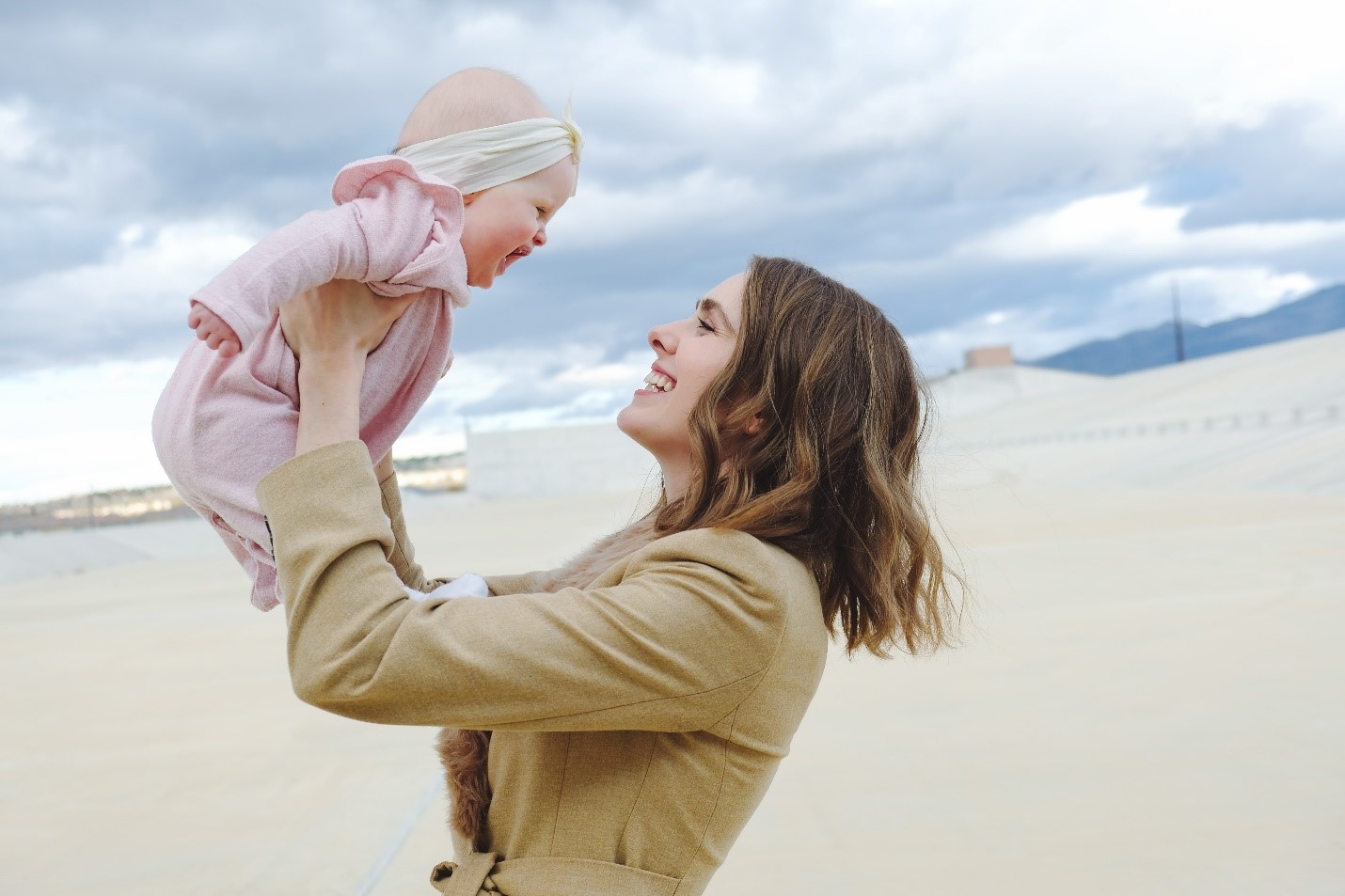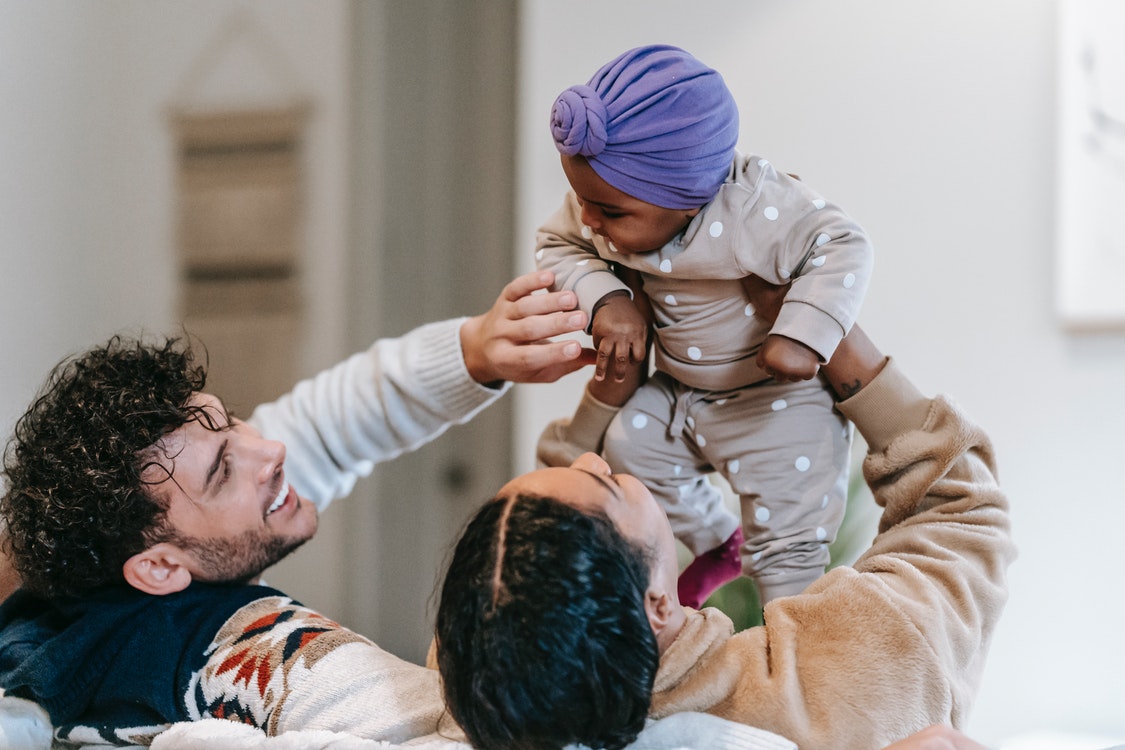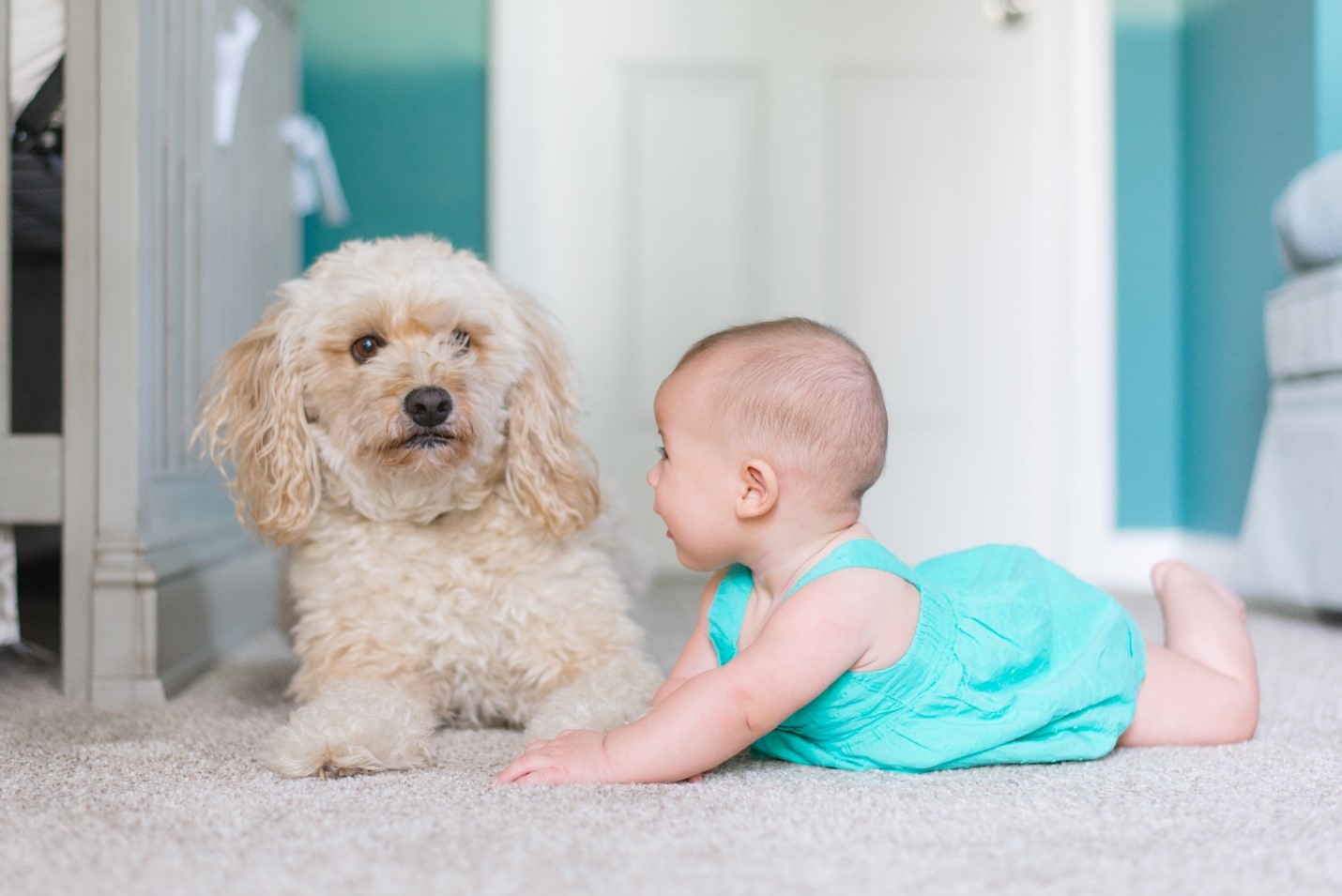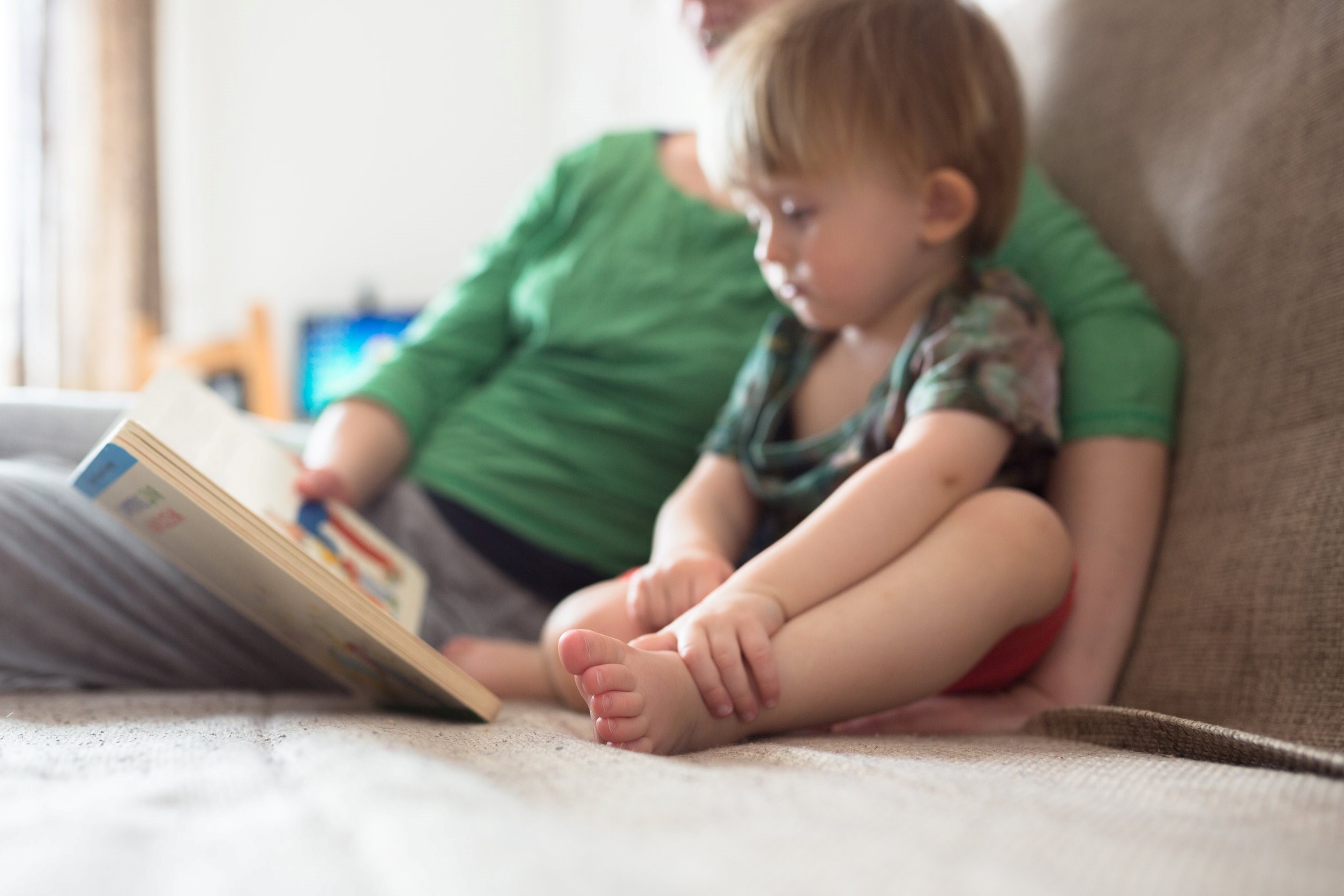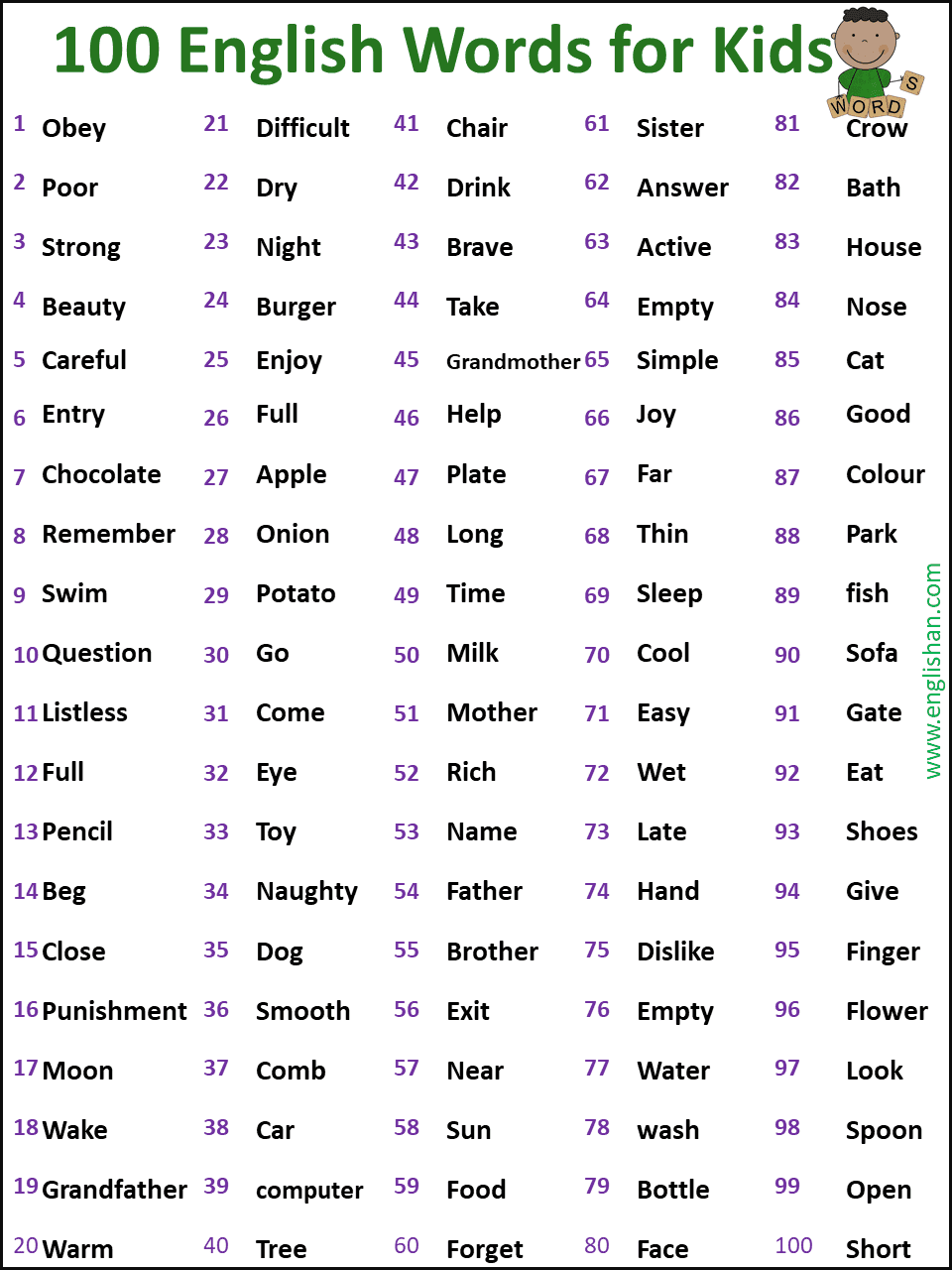Как вырастить ребенка-полиглота? Ответ простой: начать изучать с ним языки как можно раньше. Базовый английский станет отличным фундаментом для будущих знаний малыша и поможет развитию навыков обучения, ведь мозг детей в раннем возрасте впитывает как губка практически бесконечный объем информации. Главное — правильно ее подать.
В этой статье вы найдете не только простые первые английские слова для детей, но и рекомендации по их изучению. Откройте вашему малышу увлекательный мир английского языка!
С какого возраста начинаем учить?
Мнения экспертов и самих родителей о том, в каком возрасте стоит начинать учить английский язык с ребенком, расходятся. Конечно, можно начать хоть с младенчества петь малышу колыбельные на английском, но ваши силы будут потрачены практически впустую.
Большинство соглашаются в том, что самый оптимальный возраст, с которого среднестатистический ребенок начинает адекватно усваивать английский язык как иностранный — это 2,5-3 года. Считается, что в этом возрасте уже заканчивается процесс формирования родной речи. То есть, ребенок должен уметь чисто выговаривать русские звуки и слова, а также строить предложения и иметь связную речь.
Исключения здесь составляют случаи, когда ребенок растет в мультикультурной среде. Например, если мама — русская, а папа — англичанин, то можно с самого начала общаться с ребенком на двух языках. Правда, тогда ваше чадо будет забавно формировать предложения, и в доме постоянно будут звучать вопросы вроде: «Mom, а можно мне an apple».
Такой подход хорош, когда семья живет за границей, где основным языком является иностранный. Став старше и начав посещать детский сад, ребенок поймет, чем отличаются языки его родителей и начнет употреблять слова в правильном контексте. Это относится, кстати, не только к английскому языку, но и к любому иностранному.
Если хотите, чтобы ваш ребенок с самого начала разговаривал только на английском — можно создать мультикультурную среду искусственно. Например, дома разговаривая с малышом только на иностранном.
Есть возможность отдать чадо в языковые ясли или детский сад с английским уклоном? Тогда делайте это без лишних раздумий. Так мультикультурная среда будет естественна для ребенка: в яслях с ним будут общаться в основном на английском, а дома вы сможете разговаривать с малышом на русском. В специализированных языковых детских садах воспитатели помогут ребенку выучить английский в естественной среде, а дома вы можете закреплять с ним знания при помощи различных игр и загадок.
Если же отдать ребенка в языковой детский сад нет возможности — начинайте учить английский дома при помощи тех же методов, какими вы изучали с ним родной язык.
Как учить английский язык с ребенком?
В юном возрасте, конечно, не идет речь о грамматике или написании английских слов. Для начала ребенку нужно научиться правильно произносить звуки, запомнить буквы и сформировать базовый словарный запас. Кстати, малышу будет гораздо проще, чем взрослому человеку, запомнить правильное произношение английских звуков, так отличающихся от русских. Им не придется так же сильно перестраивать свой артикуляционный аппарат как нам, взрослым, которые уже много лет говорят на родном языке.
Вот список навыков, которые нужно развивать у дошкольника в первую очередь:
— восприятие речи на слух
— говорение
— чтение
Для того, чтобы изучение английского языка не стало ребенку в тягость — добавьте элемент игры в процесс обучения.
Приобретите яркую куклу-перчатку и сделайте ее своеобразным «учителем» для ребенка. Познакомьте малыша с новой игрушкой и скажите, что она понимает только по-английски, а значит, чтобы играть с ней, ребенку нужно выучить новый интересный язык. Так эта игрушка станет основным посредником между вами и ребенком в изучении английского.
Первым делом — выучите с ребенком алфавит и правильное произношение букв и основных звуков. Сделать это лучше при помощи популярной ABC Song. Так учат английский алфавит во всем мире не только иностранцы, но и сами носители языка.
Далее — формируйте базовый английский для детей: слова и простые фразы. Например, сделайте карточки на основные слова, которые ребенок уже знает на родном языке. Это могут быть предметы быта, животные, части тела и т.д. Лучше, чтобы карточки были яркие, с написанием слова и картинкой, символизирующей тот или иной предмет. Можете наклеить эти карточки на домашние предметы, чтобы ребенок постоянно видел названия предметов на английском и запоминал их автоматически.
Включите английские слова в свой постоянный лексикон при общении с ребенком. В контексте происходящего вокруг малышу будет гораздо проще понять и выучить язык. Играя дома или находясь на улице, используйте уже изученные фразы и слова. Если ребенок говорит вам: «Мама, смотри, кошечка!», то отвечайте: «Да, и правда, это кошка. А как это будет по-английски? A cat. This is a cat».
Кстати, лучше начинать учить не просто отдельные слова, а сразу целые фразы, как в примере выше. То есть, знакомить с самой-самой базовой грамматикой. Ведь если вы будете говорить ребенку только слова — он и будет знать только перевод, а если начнете использовать целые предложения, то и он будет запоминать предложениями.
Для изучения английского языка с ребенком важна наглядность и разнообразие. Детям могут понравиться книжки на английском языке с яркими картинками, которые можно читать вместе перед сном вместо обычных русских сказок. Также, не забывайте про специальные обучающие мультфильмы на английском языке, где яркие герои рассказывают ребенку об основах языка или учат с ним алфавит.
Затевайте с малышом веселые игры с обучающим элементом, чтобы ему было не скучно изучать английский. Это могут быть карточки, пантомимы, рисунки и многое другое.
Базовый набор слов с транскрипцией и переводом
Первые английские слова для детей, с которых стоит начать изучение языка — это те, что окружают ребенка ежедневно. Ниже вы найдете список таких слов по темам.
Family [ˈfæmɪli] — семья
Mother [ˈmʌðə] — мать
Father [ˈfɑːðə] — отец
Brother [ˈbrʌðə] — брат
Sister [ˈsɪstə] — сестра
Grandmother [ˈgrænˌmʌðə] — бабушка
Grandfather [ˈgrændˌfɑːðə] — дедушка
Body [ˈbɒdi] — тело
Head [hed] — голова
Hair [heə] — волосы
Eyes [aɪz] — глаза
Nose [nəʊz] — нос
Teeth [tiːθ] — зубы
Lips [lɪps] — губы
Ears [ɪəz] — уши
Neck [nek] — шея
Shoulders [ˈʃəʊldəz] — плечи
Leg [leg] — нога
Feet [fiːt ] — стопы
Pets [pets] — питомцы
Dog [dɒg] — собака
Cat [kæt] — кошка
Kitten [ˈkɪtn] — котенок
Puppy [ˈpʌpi] — щенок
Rabbit [ˈræbɪt] — кролик
Parrot [ˈpærət] — попугай
Fish [fɪʃ] — рыбка
Hamster [ˈhæmstə] — хомяк
Snake [sneɪk] — змея
Turtle [ˈtɜːtl] — черепаха
Animals [ˈænɪməlz] — животные
Goat [gəʊt] — коза
Pig [pɪg] — свинья
Sheep [ʃiːp] — овца
Horse [hɔːs] — лошадь
Cow [kaʊ] — корова
Goose [guːs] — гусь
Chicken [ˈʧɪkɪn] — курица
Duck [dʌk] — утка
Cockerel [ˈkɒkərəl] — петух
Fox [fɒks] — лиса
Wolf [wʊlf] — волк
Bear [beə] — медведь
Hare [heə] — заяц
Elephant [ˈelɪfənt] — слон
Tiger [ˈtaɪgə] — тигр
Lion [ˈlaɪən] — лев
Crocodile [ˈkrɒkədaɪl] — крокодил
Giraffe [ʤɪˈrɑːf] — жираф
Colors [ˈkʌləz] — цвета
Red [red] — красный
Green [griːn] — зеленый
Blue [bluː] — голубой
Orange [ˈɒrɪnʤ] — оранжевый
Yellow [ˈjeləʊ] — желтый
Pink [pɪŋk] — розовый
Grey [greɪ] — серый
Black [blæk] — черный
White [waɪt] — белый
Purple [ˈpɜːpl] — фиолетовый
Brown [braʊn] — коричневый
Food [fuːd] — еда
Water [ˈwɔːtə] — вода
Tea [tiː] — чай
Juice [ʤuːs] — сок
Sugar [ˈʃʊgə] — сахар
Salt [sɒlt] — соль
Yogurt [ˈjɒgət] — йогурт
Bread [bred] — хлеб
Milk [mɪlk] — молоко
Cheese [ʧiːz] — сыр
Eggs [egz] — яйца
Butter [ˈbʌtə] — масло
Meat [miːt] — мясо
Cookies [ˈkʊkiz] — печенье
Chocolate [ˈʧɒkəlɪt] — шоколад
Fruits [fruːts] — фрукты
Apple [ˈæpl] — яблоко
Pear [peər] — груша
Orange [ˈɒrɪnʤ] — апельсин
Banana [bəˈnɑːnə] — банан
Lemon [ˈlemən] — лимон
Pineapple [ˈpaɪnˌæpl] — ананас
Grapes [greɪps] — виноград
Kiwi [ˈkiːwi:] — киви
Tangerine [tæn(d)ʒəˈriːn] — мандарин
Melon [ˈmelən] — дыня
Watermelon [ˈwɔːtəˌmelən] — арбуз
Peach [piːʧ] — персик
Vegetables [ˈveʤɪtəblz] — овощи
Carrot [ˈkærət] — морковь
Onion [ˈʌnjən] — лук
Garlic [ˈgɑːlɪk] — чеснок
Tomato [təˈmɑːtəʊ] — томат
Cabbage [ˈkæbɪʤ] — капуста
Pepper [ˈpepər] — перец
Potato [pəˈteɪtəʊ] — картофель
Cucumber [ˈkjuːkʌmbə] — огурец
House [haʊs] — дом
Bedroom [ˈbedruːm] — спальня
Living room [ˈlɪvɪŋ ruːm] — гостиная
Kitchen [ˈkɪʧɪn] — кухня
Bathroom [ˈbɑːθruːm] — ванная комната
Fridge [frɪʤ] — холодильник
Cooker [ˈkʊkə] — плита
Table [ˈteɪbl] — стол
Chair [ʧeə] — стул
Sofa [ˈsəʊfə] — диван
Bed [bed] — кровать
Window [ˈwɪndəʊ] — окно
Mirror [ˈmɪrə] — зеркало
Towel [ˈtaʊəl] — полотенце
Toothbrush [ˈtuːθbrʌʃ] — зубная щетка
Toothpaste [ˈtuːθpeɪst] — зубная паста
Wardrobe [ˈwɔːdrəʊb] — шкаф для одежды
Cup [kʌp] — кружка
Plate [pleɪt] — тарелка
Bowl [bəʊl] — миска
Fork [fɔːk] — вилка
Spoon [spuːn] — ложка
Knife [naɪf] — нож
Clock [klɒk] — часы
Clothes [kləʊðz] — одежда
Dress [dres] — платье
Skirt [skɜːt] — юбка
Shirt [ʃɜːt] — рубашка
T-shirt [ˈtiːʃɜːt] — футболка
Jeans [ʤiːnz] — джинсы
Trousers [ˈtraʊzəz] — штаны
Shorts [ʃɔːts] — шорты
Jumper [ˈʤʌmpə] — свитер
Suit [suːt] — костюм
Coat [kəʊt] — пальто
Hat [hæt] — шапка
Socks [sɒks] — носки
Months [mʌnθs] — месяцы
January [ˈʤænjʊəri] — январь
February [ˈfebrʊəri] — февраль
March [mɑːʧ] — март
April [ˈeɪprəl] — апрель
May [meɪ] — май
June [ʤuːn] — июнь
July [ʤu(ː)ˈlaɪ] — июль
August [ˈɔːgəst] — август
September [sepˈtɛmbər] — сентябрь
October [ɒkˈtəʊbə] — октябрь
November [nəʊˈvembə] — ноябрь
December [dɪˈsembə] — декабрь
Weather [ˈweðə] — погода
Sun [sʌn] — солнце
Rain [reɪn] — дождь
Cloud [klaʊd] — облако
Wind [wɪnd] — ветер
Snow [snəʊ] — снег
Fog [fɒg] — туман
Cold [kəʊld] — холодно
Hot [hɒt] — жарко
Winter [ˈwɪntə] — зима
Spring [sprɪŋ] — весна
Summer [ˈsʌmər] — лето
Autumn [ˈɔːtəm] — осень
Этот список первых английских слов для детей далеко не полный. Включайте в него те слова, которые встречаются ребенку ежедневно.
И главное, не забывайте: чтобы учить малыша английскому языку с раннего возраста — нужно быть уверенными и в своих знаниях. Проверить ваш уровень английского перед тем, как начать заниматься языком с ребенком, можно здесь.
The first word uttered by a child is one of the most exciting moments for parents. It’s kind of like hearing your baby speak, except they are only using one word. To make it even more exciting, there are certain first words that you can expect from your little bundle of joy!
The most common baby first words include variations for parents such as “mama,” “mommy,” “dada,” “daddy,” and “papa.” After those, you can expect a wide variety of words to follow such as “no,” “uh-oh,” “please,” “ball,” and more!
This article will discuss 30 common baby first words and their meanings so you can be sure to know what to say when your darling finally starts talking.
The Most Common Baby First Words to Expect
Here is an extensive list of common baby first words and their meanings:
- Mama – This is usually the first word, or one of the very first uttered by a child. They are very likely to call their mother by this name.
- Mommy – The female version of “Daddy,” this is another favorite first word used by young children when talking about their mother or any similar-looking female.
- Dada – This is the male version of Mama, and it’s equally common for young children to use these words when referring to either parent.
- Daddy – This is one of the most common first words, and it usually comes after they’ve seen you for a while or have been given to their father.
- Papa – This is another common first word that babies will learn, and it usually means the same thing as “daddy.”
- Uh-Oh – This is one of the first words that young children learn, and it’s usually used when they’ve done something wrong.
- Ball – After parents, there are many first words that will be related to everyday objects. This is one of the most common, and it’s usually a ball of some kind (although sometimes children also use this word for other round things.).
- Yes – This is one of the most common first words, and it’s usually followed by another word or phrase.
- Stop – Another important first word used to express displeasure at something not wanted (such as a parent putting them down) or to emphasize something (such as “no” or “uh-oh”).
- No – This is an important word, but it’s also a slightly negative one that can be used in place of “No.” You should teach your child the appropriate times to use this word, so they don’t accidentally start saying something inappropriate!
- Up – The opposite of down, babies will learn these words at a very young age. They can be used to express that something is not where it should be or as an expression of excitement about being picked up from the ground!
- Down – The opposite of up, this word will also be learned early on by babies and toddlers. It’s usually paired with “up” but can also mean other things, like the opposite of “stop” or that something is not where it should be.
- Doggy – This word will usually follow the naming of a specific animal, and your child might repeat this many times when they see their pet in person after calling them by name at home.
- Dog – This can be one of the first words, and it usually means any dog in general. Children will sometimes use this word when talking about other animals too (like a cat or even lion!)
- Puppy – This is another word that will usually be used when naming a specific type of animal, and it’s often paired with the words “dog” or “cat.”
- Cat – This is another common first word, and it’s usually used to describe any feline friend.
- Kitty – This is another common first word and it will usually come after the naming of a specific type of feline.
- Bye – It’s not unusual for babies to start saying their version of “goodbye” well before they learn how to actually wave bye-bye.
- Bye-bye – Another common first word, this means that your little one wants you to pick them up or move them somewhere else. It can also be used as an all-purpose goodbye.
- More – This is a common request from babies and toddlers, who might not yet know how to ask for more by using words like “please.” It can also be used as an expression of satisfaction when they’re done eating or playing!
- Please – Another important word that will usually come after the first set of words, this is how your baby will ask for things from you. It’s important to teach them the difference between “Please” and “Thank You.”
- Thank you – This is another common first word that babies learn very early on! It shows their gratitude after they’ve been given something or allowed to do something.
- All done – They might not be able to say this word exactly, but your child will let you know when something is finished (like a meal, bath time, and playtime!)
- All gone – This is an important word for babies because it refers to something being out of their reach! They might be too young to verbalize this specifically but will show you what they mean when there’s nothing left for them to eat or play with.
- Boat – Another common first word based on an everyday object. This is usually paired with “Bye-bye” to mean the child wants you to give them their toy boat!
- Car – Another common first word based on everyday objects, this will usually refer to any type of vehicle and not just cars! You might want to teach your child about the difference between “Car” and “Train.”
- Plane – This is yet another common first word, but it can sometimes be used in place of “Car,” so you’ll want to teach your child the difference between these two vehicles. This is very common, especially in babies that are fed with the classic “here comes the plane!”
- Here – One of the very first words, this is used when they want you to come over and pick them up or give something to them. It’s also paired with “There” for a few more common word combinations like “Hide-and-Seek.”
- There – This will be another important word that your baby learns, and it’s usually paired with “Here” to mean that something is over there.
- Shoe – This is another common first word, and your toddler will usually know how to use this because they see you putting them on their feet.
When Should You Expect Their First Words?
According to parents, most babies start speaking their first words around the age of 12 months. Typically, at this time they also begin walking and making other developments in motor skills as well. It is a pivotal point in their lives and marks the beginning of a whole new world.
It can be surprising to most parents when their baby says his or her first word, but there are also words that you should expect from your little one based on statistics.
However, you can begin to expect cooing as early as 2 months old. Cooing should sound distinct from babbling. At this point they are just beginning to learn how to use their vocal cords. Parents can encourage this behavior by acknowledging them when they coo.
How Can You Encourage Your Baby to Talk?
There are many ways you can encourage your baby to speak.
Talk Back
First, talk back! As soon as they begin cooing or babbling respond by smiling and saying words like “yes” or “oh?” This encourages them to keep communicating with you in this way.
You should also get down on the floor around their level when they want something. This is a great way for them to learn valuable communication skills and how they can get what they need from an adult when in the future, it’s not possible to always have their needs met by you or someone else who loves them so much.
Listen to Them
Parents should also take the time to listen. If you’re cooking dinner and your child is playing nearby, stop for a few moments every now and then to focus on what they are saying or asking for!
Even when they’re only making random sounds, they could already be attempting to vocalize actual words. Thus, it is important to listen to them.
Read Together
Reading to your baby is another great way for them to learn! Read books that are appropriate for their age and read slowly so they can hear each word. This will help them begin to understand language as well as expand upon what words sound like outside of just hearing you speak around the house or at bedtime every night.
Sing Songs Together
This can be a great way to bond and spend quality time with your child as well. They will enjoy the tunes and repetition of certain songs, so sing these often or even just hum them when you’re thinking about them!
Repeat Words
The more parents repeat common words, the more likely their baby will learn that word and use it themselves. Try to incorporate these words into your everyday speech as much as possible, even if they don’t understand what you’re saying just yet!
Should You Worry about Their First Words?
Your baby’s first words are an important milestone.
However, if your child isn’t saying any real words by the time they’re 15 months old you should talk to their doctor. This is a reasonable expectation and might not require too much concern on your part, but it’s always better to be safe than sorry! If there is some kind of issue, early intervention can help them gain their language skills and be on the same developmental track as most children.
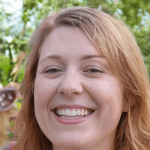
Lori Herbert lives in a house of all males — a husband and three lively boys. She believes that parenting is messy, and that’s okay. Thanks to her experience in Psychology, she’s learned how that was the case for most people — and that the best way to help them open up was through kindness, compassion, and communication.
Your Kid will love discovering new words, animals, trucks, and more in this bright and colorful worksheet!
English Created Resources prides itself on providing everything a learner needs to improve the level of English. Our website aims to provide all the required materials for English Language Teachers and Learners to help them master and improve their English, help their pupils master all the required skills.
Such materials are provided for free download to be available always for learners around the world. You can find English ESL worksheets for home learning, online practice, distance learning and English classes.
Our Website helps you to give your child a boost using our free, printable worksheets. You will be able to help your child with his grammar skills with our printable worksheets that focus on using and punctuation, Reading & writing. Such Worksheets are a useful learning tool for kids who are trying to write or want to practice their language skills at home.
Through our website, teachers will be able to help their children improve both their written and spoken English. We provide materials related to all the different skills. Our reading Comprehension Worksheets help students to master reading and writing skills. There are also questions to measure pupils’ understanding and help teachers evaluate their pupils easily.
Our Website helps you to give your child a boost using our free, printable worksheets. You will be able to help your child with his grammar skills with our printable worksheets that focus on using and punctuation, Reading & writing. Such Worksheets are a useful learning tool for kids who are trying to write or want to practice their language skills at home.
We also provide coloring worksheets for lower levels to help them learn in an interactive and creative way.
Such worksheets are printable to be used either at class or home.
English Teacher and Content Creator
An easy way to learn new words
An easy way to learn new words
My first words
Unit 1
My first words
Unit 2
My first words
Unit 3
My first words
Unit 4
My first words
Unit 5
My first words
Unit 6
My first words
Unit 7
My first words
Unit 8
My first words
Unit 9
My first words
Unit 10
If you want to teach vocabulary to toddlers and other small kids, you must start with the basic, very simple, easy-to-learn, and daily used vocabulary. If you are not sure which type of vocabulary words are easy yet important for your kids to learn, then this post is for you. You can teach your children basic vocabulary from our 100 basic vocabulary words for kids list along with their pictures and meaning. This post is designed especially for kids that cover more than 20% of their daily used vocabulary. Let’s together help the kids to enhance their vocabulary collection.
|
1. Obey Obey my order. |
|
2. Mother I love my mother. |
|
3. Poor Respect the poor. |
|
4. Strong Stay healthy and strong. |
|
5. Rich He is a rich man. |
|
6. Beauty Simplicity is the best beauty. |
|
7. Name What’s your name? |
|
8. Careful Be careful. |
|
9. Father I love my father. |
|
10. Entry I’ll not allow your entry. |
|
11. Brother I have three brothers. |
|
12. Far He was sitting far away from his friend. |
|
13. Chocolate Don’t eat chocolate every day. |
|
14. Exit Where is the exit door? |
|
15. Forget Don’t forget to come. |
|
16. Remember Remember to offer prayer. |
|
17. Near I am near your house. |
|
18. Swim Don’t swim in muddy water. |
|
19. Question Do you have any questions? |
|
20. Listless He is feeling listless nowadays. |
|
21. Full This table is full. |
|
22. Pencil Give me your pencil. |
|
23. Sun Sun is the biggest source of energy. |
|
24. Beg Don’t beg for something. |
|
25. Close Close your eyes. |
|
26. Simple I like simple people. |
|
27. Punishment I don’t want to give you punishment. |
|
28. Moon Half-moon seems very beautiful. |
|
29. Joy The midnight was full of joy. |
|
30. Wake Wake up early. |
|
31. Warm Don’t drink warm water. |
|
32. Difficult This lesson is not difficult. |
|
33. Open Open your eyes. |
|
34. Dry I like dry fruits. |
|
35. Night The sky is full of stars at night. |
|
36. Burger Do you like burgers? |
|
37. Enjoy Enjoy your meal. |
|
38. Full The bucket is full of water. |
|
39. Food Vegetables are healthy food. |
|
40. Apple Eat one apple per day. |
|
41. Onion I don’t like to eat onion. |
|
42. Potato I like potatoes. |
|
43. Go Go to sleep early. |
|
44. Come Come here. |
|
45. Eye He has beautiful eyes. |
|
46. Toy Kids like to play with toys. |
|
47. Naughty He is very naughty. |
|
48. Dog Dogs are human’s best friends. |
|
49. Smooth Some clothes are very smooth. |
|
50. Comb Comb your hair. |
|
51. Car I like a black car. |
|
52. Tree Trees are the source of oxygen. |
|
53. Chair I was sitting on a chair. |
|
54. Drink Drink water slowly. |
|
55. Brave Be brave. |
|
56. Take You can take this pencil. |
|
57. Grandfather I love my grandfather. |
|
58. Help Help the poor. |
|
59. Bottle Fill the water in the bottle. |
|
60. Plate Why did you break the plate? |
|
61. Long She has long hair. |
|
62. Time Don’t waste time. |
|
63. Milk I love drinking milk. |
|
64. Sister I have three sisters. |
|
65. Answer Answer this question. |
|
66. Active He is very active |
|
67. Empty The room is empty. |
|
68. Sleep Go to sleep. |
|
69. Cool The water is cool. |
|
70. Easy The paper was very easy. |
|
71. Wet The baby was wearing wet clothes. |
|
72. Late Don’t be late. |
|
73. Hand Wash your hands. |
|
74. Dislike I dislike dishonesty. |
|
75. Empty Why the house is empty? |
|
76. Water Don’t waste water. |
|
77. Wash Wash your face. |
|
78. Face The baby looked at me with a smiley face. |
|
79. Crow Crow is an intelligent bird. |
|
80. Bath Take bath daily. |
|
81. House Keep your house clean. |
|
82. Nose His nose was bleeding. |
|
83. Cat Cat is a beautiful pet. |
|
84. Good Do good, have good |
|
85. Small His house is very small. |
|
86. Colour Pakistanis have a brown color. |
|
87. Park Park the car on the side. |
|
88. fish Fish live in water. |
|
89. Sofa This sofa is very comfortable. |
|
90. Gate Open the gate. |
|
91. Eat Eat the meal slowly. |
|
92. Shoes Which shoes would you like to wear? |
|
93. Give Give me a glass of water. |
|
94. Finger Lower your finger. |
|
95. Flower I love rose flowers. |
|
96. Look Look at me. |
|
97. Spoon This spoon is made of steel. |
|
98. Short Please choose the short route. |

